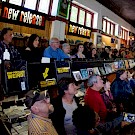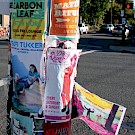 Every year, independent labels and their industry partners gather in New York for Indie Week. Hosted by the American Association of Independent Music, which represents over 350 independent record labels, Indie Week is a chance for industry leaders to discuss where the music business is headed. Portia Sabin sat down with a panel of representatives from Mute, ABKCO, Omnian and Concord to talk everything from catalogs to Spotify.
Every year, independent labels and their industry partners gather in New York for Indie Week. Hosted by the American Association of Independent Music, which represents over 350 independent record labels, Indie Week is a chance for industry leaders to discuss where the music business is headed. Portia Sabin sat down with a panel of representatives from Mute, ABKCO, Omnian and Concord to talk everything from catalogs to Spotify.
With a roster that includes artists like Mac DeMarco, Paul McCartney, Joan Baez, Perfect Pussy and The Rolling Stones, the panelists began their conversation with the question of how to market old, or catalog, records and new releases. “Marketing catalog, in some ways, can be more difficult and in other ways a little easier than marketing new releases,” says Jim Selby, general manager of Concord. “There is a built-in fan base for a lot of catalog we have... finding new fans for our catalog is the difficult part of marketing.”
So how does a label balance marketing its catalog with its new releases? Mute’s VP of marketing, Nicole Blonder, says it’s a matter of using your catalog in different contexts, capitalizing on social media, and utilizing streaming playlists. “For us,” she says, “there is a really good opportunity to cross-market.” Blonder is referencing Mute’s diverse roster, which attracts different kinds of fans.
Blonder has her playlist promotional strategy down to a science. “We’ve done different themed playlists, where you draw people in based on what they like,” she tells the audience. “[You] create a playlist around a newer artist and pepper in some older ones.” Still, “It is really challenging.”
Dave Martin, Omnian’s sales and marketing director, sees similar challenges. Omnian label Captured Tracks, for example, “is a mixture of new bands, but with key reissues.” Martin continues, saying, “We like to think of it as symbiotic—that the new acts will get young kids to discover the old acts.”
Sara Dempsey of ABKCO definitely sees catalog and new releases as interconnected, emphasizing all of the panelists’ labels’ rich histories. “It’s [about] finding ways to tell the story of that music,” she says, “and I think new musicians, new artists are always influenced by what came before, so it’s always going to be resurfacing.”








